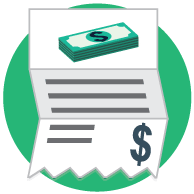 Merchant Cash Advance APR Calculator
Merchant Cash Advance APR Calculator
A merchant cash advance (MCA) is a type of financing in which a business sells a percentage of its future credit card and debit card sales for an upfront amount. It is not a loan.
A portion of your business’ debit card and credit card receipts is debited automatically each day for the duration of the repayment term. Some common merchant cash advance providers are Can Capital, Credibly, and RapidFinance.
An MCA is advantageous for businesses with unsteady cash flow or seasonal business cycles, as your repayment is not a fixed amount of money debited each day, but a percentage of your credit card sales. However, this can make it hard to calculate the total cost of a merchant cash advance. Use the cash advance calculator below to find out what you will be paying on a merchant cash advance transaction.
What is a Merchant Cash Advance?
It’s important to understand that a merchant cash advance is not a loan. It’s a cash advance with a credit limit based on your average daily balance of credit card and debit card sales. Unlike a lender who takes a fixed payment each month (including principal and fees based on the agreed-upon interest rate), repayment is a portion of your daily card sales, so what you pay will change from one day to the next.
Similar to a payday loan, a merchant cash advance is a short-term financing solution that can come with a price tag higher than other options.
How Do I Calculate the Total Cost of My Merchant Cash Advance?
It can be tricky to determine the interest charge you’ll pay for a merchant cash advance because fees are typically listed as factor rates.
A factor rate is a multiplier of the amount you have advanced. Let’s say your cash advance fee has a factor rate of 1.5 and you are advanced $50,000. To calculate the total you’ll pay back, multiply the advance and the factor rate:
50,000×1.5=75,000
With this example, you would pay in total $75,000 for a $50,000 merchant cash advance. If you were to translate this into an interest rate, it would be 50%, a much higher finance charge than you would pay with other types of financing.
Unfortunately, there’s no easy way to calculate what your monthly payment will be on a merchant cash advance because it’s based on your daily credit card and debit card sales, and those likely fluctuate.
Who Should Take Out A Merchant Cash Advance?
If you have an unsteady cash flow and revenue stream, a merchant cash advance can ensure you never pay more than you can afford on your financing each day. If you were to take out a traditional loan, the lender would set you up with a fixed monthly payment, and if you weren’t able to make a payment, you could default on your loan. That can’t happen with a merchant cash advance, as long as you are making credit or debit card sales.
Also, if you have struggled to qualify for other types of financing, an MCA could be a good option, despite its high price tag.
How Does A Merchant Cash Advance Compare to Other Financing Options?
Certainly, there are cheaper financing options than the merchant cash advance with its hefty cash advance fee.
A traditional loan, either through a bank or a credit union, has a more steady repayment schedule, and your interest rate could be fixed or variable APR.
A credit card might have a similar annual percentage rate to a merchant cash advance, though you may be able to find a card issuer who offers a 0% intro APR or low credit card interest if you have great credit.
If your business isn’t established enough to qualify for financing, you could also consider a personal loan if your credit is good, or look at payday lenders if you’re in a pinch (but know you’ll pay steeply to access this capital).
Nav has several loan calculators you can use to weigh one type of financing against another to choose the one that best suits your needs.
Do Cash Advances Hurt Your Credit?
Just like any loan or type of financing, merchant cash advances may impact your personal or business credit scores. They may be reported as debt, and if your debt to credit ratio gets too high, you may find your credit score lowered and it may be difficult to qualify for other types of financing.
Also if you don’t make the minimum payment on your advance (which should come out of your card sales), you might also see a dip in your credit scores. On the other hand, if you pay back your advance in a timely manner, it might raise your credit scores.
How Can I Avoid Paying Interest on a Cash Advance?
While you likely can’t avoid all cash advance fees, you may be able to lower the fees you do pay simply by allowing the merchant cash advance provider to take a greater portion of your debit or credit card sales for repayment each day.
It may also be possible to make additional repayments on your advance to cut down on how much you pay in interest or fees over time.
Add the Merchant Cash Advance APR Calculator to your website, copy & paste the code below
<!-- Start https://www.nav.com Merchant Cash Advance APR Calculator --> <div id="embedded-calc-mca" class="embedded-calc"> <div class="powered-by">Powered by <a href="https://wp.staging.nav.com">nav</a></div> </div> <script src="https://wp.staging.nav.com/calculators/embed_mca_calc_v2.js"></script> <!-- End https://www.nav.com Merchant Cash Advance APR Calculator -->
This article was originally written on October 13, 2015 and updated on December 13, 2021.